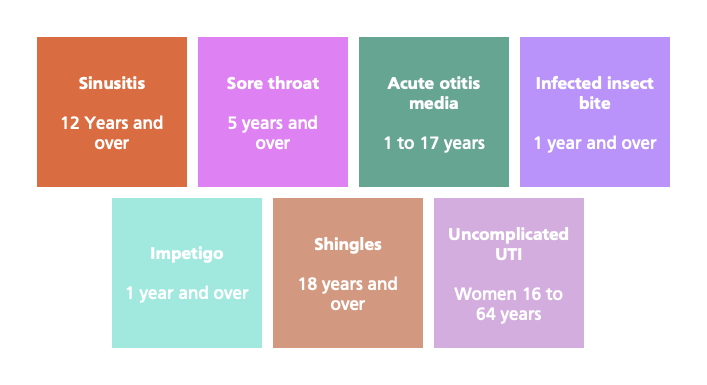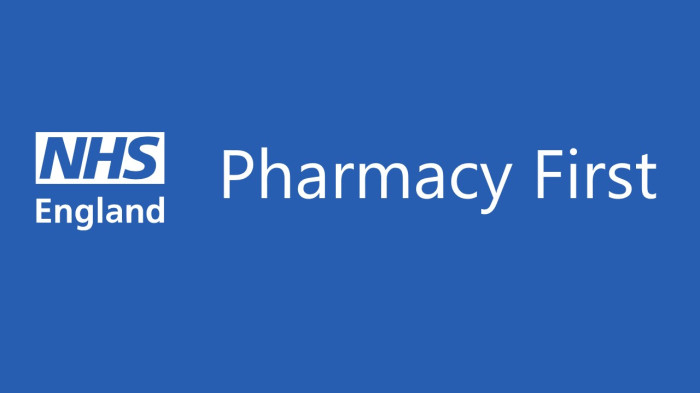Non-urgent advice: What is pharmacy First?
Some conditions can be diagnosed and prescription treatments can be provided by pharmacists.
For the 7 common conditions included, pharmacists will follow a robust clinical pathway which includes self care and safety-netting advice and, only if appropriate, supplying a restricted set of prescription only medicines without the need to visit a GP.
These clinical pathways have been developed with input from various experts including practising GPs, pharmacists, and antimicrobial resistance specialists as well as representatives from national organisations such as the National Institute for Health and Care Excellence (NICE) and UK Health Security Agency. This ensures that the steps we take together match the care patients would receive in general practice and follow the latest national guidelines.
Pharmacies have private consultation rooms that can be used for consultations with patients, and pharmacists can see patients for clinical services without always needing an appointment.
Every pharmacist trains for 5 years in the use of medicines and managing minor illnesses, so they are well equipped to provide health and wellbeing advice to help people stay well. They are also experienced in spotting warning signs (otherwise known as red flag symptoms) which may warrant a referral to another healthcare provider.
After a consultation with the pharmacist, the pharmacy will send a notification to the patient’s GP on the same day or on the following working day.
What does the service involve?
The Advanced service involves pharmacists providing advice and NHS-funded treatment, where clinically appropriate, for seven common conditions (age restrictions apply):
For the 7 common conditions included, pharmacists will follow a robust clinical pathway which includes self care and safety-netting advice and, only if appropriate, supplying a restricted set of prescription only medicines without the need to visit a GP.
These clinical pathways have been developed with input from various experts including practising GPs, pharmacists, and antimicrobial resistance specialists as well as representatives from national organisations such as the National Institute for Health and Care Excellence (NICE) and UK Health Security Agency. This ensures that the steps we take together match the care patients would receive in general practice and follow the latest national guidelines.
Pharmacies have private consultation rooms that can be used for consultations with patients, and pharmacists can see patients for clinical services without always needing an appointment.
Every pharmacist trains for 5 years in the use of medicines and managing minor illnesses, so they are well equipped to provide health and wellbeing advice to help people stay well. They are also experienced in spotting warning signs (otherwise known as red flag symptoms) which may warrant a referral to another healthcare provider.
After a consultation with the pharmacist, the pharmacy will send a notification to the patient’s GP on the same day or on the following working day.
What does the service involve?
The Advanced service involves pharmacists providing advice and NHS-funded treatment, where clinically appropriate, for seven common conditions (age restrictions apply):

Non-urgent advice: Treatment from a pharmacist
Treatment from a pharmacist
Pharmacists can suggest treatments that do not need a prescription for a range of conditions.
Most pharmacies can also offer prescription medicine for some conditions, without you needing to see a GP or make an appointment. This is called Pharmacy First.
Conditions they can offer prescription medicine for are:
impetigo (aged 1 year and over)
infected insect bites (aged 1 year and over)
earache (aged 1 to 17 years)
sore throat (aged 5 years and over)
sinusitis (aged 12 years and over)
urinary tract infections (UTIs) (women aged 16 to 64 years)
shingles (aged 18 years and over)
If you are not within these age ranges, a pharmacist can still offer advice and support decisions about self care treatment with over the counter medicines, but you may need to see a GP for treatment.
If you go to a pharmacy with one of these conditions, the pharmacist will offer you advice, treatment or refer you to a GP or other health professional if needed. They will also update your GP health record, but your information will not be shared with anyone else.
Most pharmacies can provide prescription medicine for these conditions but contact them before visiting to check.
Pharmacists can suggest treatments that do not need a prescription for a range of conditions.
Most pharmacies can also offer prescription medicine for some conditions, without you needing to see a GP or make an appointment. This is called Pharmacy First.
Conditions they can offer prescription medicine for are:
impetigo (aged 1 year and over)
infected insect bites (aged 1 year and over)
earache (aged 1 to 17 years)
sore throat (aged 5 years and over)
sinusitis (aged 12 years and over)
urinary tract infections (UTIs) (women aged 16 to 64 years)
shingles (aged 18 years and over)
If you are not within these age ranges, a pharmacist can still offer advice and support decisions about self care treatment with over the counter medicines, but you may need to see a GP for treatment.
If you go to a pharmacy with one of these conditions, the pharmacist will offer you advice, treatment or refer you to a GP or other health professional if needed. They will also update your GP health record, but your information will not be shared with anyone else.
Most pharmacies can provide prescription medicine for these conditions but contact them before visiting to check.
